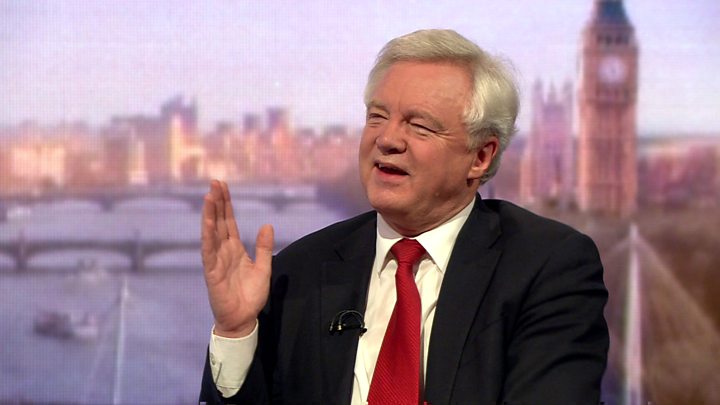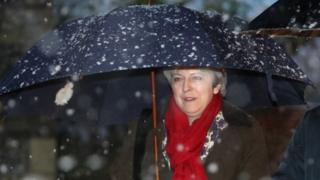Brexit: Theresa May claims new sense of optimism in talks
Theresa May will tell MPs there is a new "sense of optimism" in the Brexit talks after her last-minute deal aimed at moving them to the next phase.
She will say she expects EU leaders to agree to start talks about future trade and security at a summit on Thursday.
The PM will insist she did not cave in to Brussels over the so-called divorce bill and "alignment" with EU laws.
And that she had stuck to the principles she first set out in a speech about Brexit in January.
- Davis wants 'Canada plus' trade deal
"I know that some doubted we would reach this stage," she will tell MPs.
"I have always been clear that this was never going to be an easy process. It has required give and take for the UK and the EU to move forwards together. And that is what we have done."
'Hard border'
The UK is due to leave the EU in March 2019 but wants a two-year transition period after that date, with continued access to the single market to allow businesses to adjust.
That is expected to be the focus of the next round of talks in Brussels in the new year, before discussions can start on a free trade agreement.
The EU would not agree to move forward with talks until the UK agreed on a figure for its divorce bill.
The Treasury indicated on Friday that it would be between £35bn and £39bn, paid over four years.
The sticking point on the Irish border was also addressed, with both sides vowing to prevent the return of a "hard border".
 Media playback is unsupported on your device
Media playback is unsupported on your deviceBut a clause inserted at the insistence on Irish government says the UK would have full "regulatory alignment" with the EU in some areas if it leaves the EU without a deal.
Some have interpreted this as a victory for a "soft" Brexit, that would see the UK continue to be closely aligned with the EU single market and customs union but unable to strike its own trade deals.
Brexit Secretary David Davis said the chances of the UK exiting without a deal had "dropped dramatically" following Friday's statement.
'Canada plus'
But he said if the UK did leave without a deal, the agreement on the border was not "legally enforceable" – and Britain would not pay any money to the EU.
He stressed that the UK was committed to a "frictionless and invisible" Irish border – and it would "find a way" to keep that in the event of a "no deal" Brexit.
He said he wanted an "overarching" free trade deal without tariff barriers, which he described as "Canada plus plus plus" – a reference to the free trade deal struck between Canada and the EU.
But unlike the Canada deal, he wants financial services to be included in the tariff-free area, he told the BBC's Andrew Marr.
Few Conservative Brexiteers have openly criticised the prime minister's deal, although the former Brexit minister David Jones suggested it needed to be "refined" and that the divorce bill could be far higher than £39bn.
But veteran Europhile Ken Clarke said the PM would still need to "face down" the "40 or 50" critics on her own benches, who were "very excited" about "the so-called hard Brexit thing".
In her statement on Monday, Mrs May will tell MPs "this is not about a hard or a soft Brexit" – and say the agreement reached in Brussels is "consistent" with her earlier statements on leaving the single market the customs union and regaining control of borders.
The Scottish National Party is urging a cross-party push to keep the UK in EU single market and customs union – something backed by the Lib Dems.
But Labour has ruled this out, saying it wants a post-Brexit partnership with the EU that "retains the benefits of the single market and the customs union".
Labour's new position
Analysis by the BBC's Iain Watson
The EU has asked for more clarity from the UK on what it wants from trade talks. But today it was the opposition who gave more details than ever before.
So far Labour has said, if in power, it would stay in the single market and customs union in a transition period.
But now the shadow Brexit secretary has talked about the benefits of staying in alignment with the EU in the longer term.
And he has even suggested he'd be willing to pay for the type of single market access that Norway enjoys.
Shadow foreign secretary Emily Thornberry has raised the possibility of staying in a form of customs union.
That might restrict the ability to do global trade deals but – as she puts it – she doesn't want to "kybosh" trade with the EU.
For the Conservatives in the short term it's a political gift – they can portray Labour as rule takers who are prepared to pay far more to Brussels than their divorce settlement.
But it's more likely a sign that "creative ambiguity" across the political spectrum could be unsustainable when serious trade talks begin.

